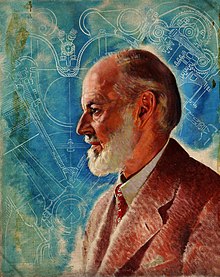Frederick Henry Royce
| Sir Henry Royce, Bt | |
|---|---|
 |
|
| Born |
27 March 1863 Alwalton, Huntingdonshire, England |
| Died | 22 April 1933 (aged 70) West Wittering, Sussex, England |
| Nationality | English |
| Engineering career | |
| Projects | Rolls-Royce |
Sir Frederick Henry Royce, 1st Baronet, OBE (27 March 1863 – 22 April 1933) was an English engineer and car designer who, with Charles Rolls and Claude Johnson, founded the Rolls-Royce company.
Frederick Henry Royce was born in Alwalton, Huntingdonshire, near Peterborough, in 1863, to James and Mary Royce (née King), as the youngest of their five children. His family ran a flour mill which they leased from the Ecclesiastical Commissioners but the business failed and the family moved to London. His father died in 1872 and Royce had to go out to work selling newspapers and delivering telegrams, having had only one year of formal schooling.
In 1878 he started an apprenticeship with the Great Northern Railway company at its works in Peterborough thanks to the financial help of an aunt. After three years the money ran out and, after a short time with a tool-making company in Leeds, he returned to London and joined the Electric Light and Power Company. He moved to their Liverpool office in 1882 working on street and theatre lighting.
In 1884, with £20 of savings, he entered a partnership with Ernest Claremont, a friend who contributed £50, and they started a business making domestic electric fittings in a workshop in Cooke Street, Hulme, Manchester, called F H Royce and Company. In 1894 they started making dynamos and electric cranes and F.H. Royce & Company was registered as a limited liability company. The company was re-registered in 1899 as Royce Ltd. with a public share flotation and a further factory opened in Trafford Park, Manchester.
Following a decline in trade after the Second Boer War, and the arrival of increasing competition in cranes and dynamos from Germany and the United States, Royce began considering the motor car as a potential new product for the company. With his fascination for all things mechanical he became increasingly focused on motor cars and bought first, in 1901, a small De Dion and in 1902 or 1903 a 1901 model two cylinder Decauville. This did not meet his high standards and so he first improved it and then decided to manufacture a car of his own which he did in a corner of the workshop in 1904.
...
Wikipedia
